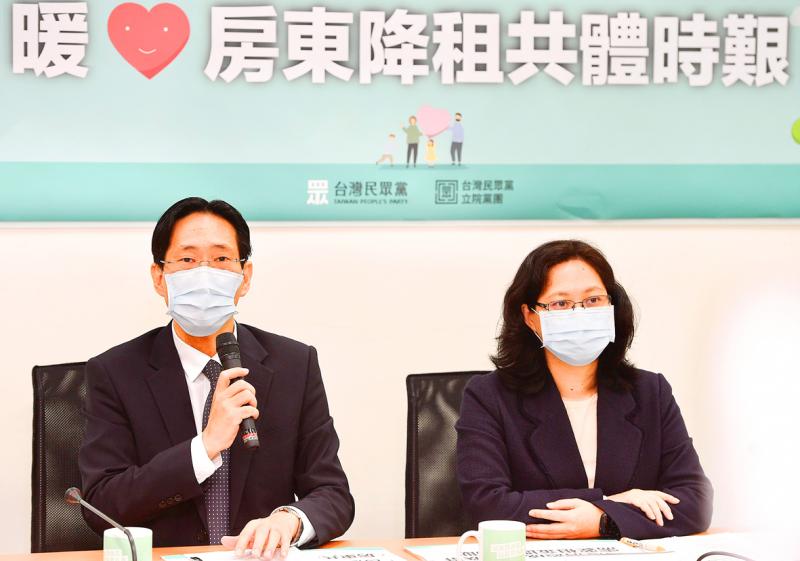Taiwan People’s Party (TPP) lawmakers yesterday urged landlords nationwide to reduce their rents amid the COVID-19 pandemic.
The global spread of the novel coronavirus has led to an increase in the number of people who are unemployed and has affected disadvantaged groups, the TPP legislative caucus told a news conference in Taipei.
Low-income families were already struggling before the pandemic, it said, adding that rent alone puts an enormous amount of pressure on those families.

Photo: George Tsorng, Taipei Times
Over the past few years, not only have property prices soared, but rent has also gone up “outrageously,” TPP Legislator Jang Chyi-lu (張其祿) said.
Now, in the midst of the crisis, many shop owners have found themselves unable to pay rent, he said, adding that some restaurants have already gone out of business.
Some landlords — including the central and local governments — have begun to lower rent for their tenants, Jang said, citing as examples the Taiwan Railways Administration and Taiwan High Speed Rail Corp, which have vowed to cut rent by at least 25 percent.
Landlords should sympathize with tenants and reduce or delay rent payments, the party said.
Tsuei Ma Ma Foundation for Housing and Community Services CEO Lu Ping-yi (呂秉怡) said that for most tenants, rent is their largest expense, consuming about 30 to 50 percent of their income.
As a result, when problems with their jobs arise, rent becomes a heavy burden, he said.
Lu echoed the party’s call for landlords to lower rent for tenants from a “philanthropic” perspective.
It would not be easy for landlords to find new tenants for their properties under the current situation should existing ones leave because they cannot pay the full rent, he said.
Instead of spending months without rental income, landlords might as well cut rent by 20 to 30 percent, he added.
TPP Legislator Lai Hsiang-ling (賴香伶) said that the government should set up a platform to help tenants struggling to pay rent due to a decrease in or loss of income negotiate rent deferrals with their landlords.
It should also ensure that when it lowers rent for businesses operating on publicly owned real estate, those cuts are extended to the businesses’ subtenants, she added.

Taiwan is stepping up plans to create self-sufficient supply chains for combat drones and increase foreign orders from the US to counter China’s numerical superiority, a defense official said on Saturday. Commenting on condition of anonymity, the official said the nation’s armed forces are in agreement with US Admiral Samuel Paparo’s assessment that Taiwan’s military must be prepared to turn the nation’s waters into a “hellscape” for the Chinese People’s Liberation Army (PLA). Paparo, the commander of the US Indo-Pacific Command, reiterated the concept during a Congressional hearing in Washington on Wednesday. He first coined the term in a security conference last

Prosecutors today declined to say who was questioned regarding alleged forgery on petitions to recall Democratic Progressive Party (DPP) legislators, after Chinese-language media earlier reported that members of the Chinese Nationalist Party (KMT) Youth League were brought in for questioning. The Ministry of Justice Investigation Bureau confirmed that two people had been questioned, but did not disclose any further information about the ongoing investigation. KMT Youth League members Lee Hsiao-liang (李孝亮) and Liu Szu-yin (劉思吟) — who are leading the effort to recall DPP caucus chief executive Rosalia Wu (吳思瑤) and Legislator Wu Pei-yi (吳沛憶) — both posted on Facebook saying: “I

The Ministry of Economic Affairs has fined Taobao NT$1.2 million (US$36,912) for advertisements that exceed its approved business scope, requiring the Chinese e-commerce platform to make corrections in the first half of this year or its license may be revoked. Lawmakers have called for stricter enforcement of Chinese e-commerce platforms and measures to prevent China from laundering its goods through Taiwan in response to US President Donald Trump’s heavy tariffs on China. The Legislative Yuan’s Finance Committee met today to discuss policies to prevent China from dumping goods in Taiwan, inviting government agencies to report. Democratic Progressive Party Legislator Kuo Kuo-wen (郭國文) said

The Ministry of Economic Affairs has fined Taobao NT$1.2 million (US$36,900) for advertisements that exceeded its approved business scope and ordered the Chinese e-commerce platform to make corrections in the first half of this year or its license would be revoked. Lawmakers have called for stricter supervision of Chinese e-commerce platforms and more stringent measures to prevent China from laundering its goods through Taiwan as US President Donald Trump’s administration cracks down on origin laundering. The legislature’s Finance Committee yesterday met to discuss policies to prevent China from dumping goods in Taiwan, inviting government agencies to report on the matter. Democratic Progressive Party